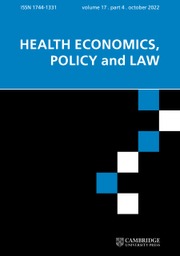Crossref Citations
This article has been cited by the following publications. This list is generated based on data provided by
Crossref.
Cleemput, Irina
Franken, Margreet
Koopmanschap, Marc
and
le Polain, Maïté
2012.
EUROPEAN DRUG REIMBURSEMENT SYSTEMS' LEGITIMACY: FIVE-COUNTRY COMPARISON AND POLICY TOOL.
International Journal of Technology Assessment in Health Care,
Vol. 28,
Issue. 4,
p.
358.
Fischer, Katharina E.
Stollenwerk, Björn
and
Rogowski, Wolf H.
2013.
Link between Process and Appraisal in Coverage Decisions.
Medical Decision Making,
Vol. 33,
Issue. 8,
p.
1009.
Wang, Daniel W. L.
2013.
Courts and health care rationing: the case of the Brazilian Federal Supreme Court.
Health Economics, Policy and Law,
Vol. 8,
Issue. 1,
p.
75.
Syrett, K.
2014.
Courts, Expertise and Resource Allocation: Is there a Judicial 'Legitimacy Problem'?.
Public Health Ethics,
Vol. 7,
Issue. 2,
p.
112.
Raftery, James
2014.
Health economic evaluation in England.
Zeitschrift für Evidenz, Fortbildung und Qualität im Gesundheitswesen,
Vol. 108,
Issue. 7,
p.
367.
Jonas, Monique
Kolbe, Anne
and
Warin, Briar
2014.
Publish or be damned: Individual Funding Requests and the publicity condition.
Journal of Medical Ethics,
Vol. 40,
Issue. 12,
p.
827.
Russell, Jill
and
Greenhalgh, Trisha
2014.
Being ‘rational’ and being ‘human’: How National Health Service rationing decisions are constructed as rational by resource allocation panels.
Health: An Interdisciplinary Journal for the Social Study of Health, Illness and Medicine,
Vol. 18,
Issue. 5,
p.
441.
Morales, Leticia
2015.
Taking Facts Seriously: Judicial Intervention in Public Health Controversies.
Public Health Ethics,
Vol. 8,
Issue. 2,
p.
185.
McHale, Jean V.
2015.
Reflecting on ‘Health technology appraisal and the courts: accountability for reasonableness and the judicial model of procedural justice’.
Health Economics, Policy and Law,
Vol. 10,
Issue. 4,
p.
449.
Tantivess, Sripen
and
Tangcharoensathien, Viroj
2016.
Coverage Decisions and the Court: A Public Health Perspective on Glucosamine Reimbursement in Thailand.
Health Systems & Reform,
Vol. 2,
Issue. 2,
p.
106.
Morales, Leticia
2016.
Republicanism and the Paradox of Public Health Preconditions Comments on Steve Latham.
Public Health Ethics,
Vol. 9,
Issue. 2,
p.
150.
Ettelt, Stefanie
2018.
Evidence Use in Health Policy Making.
p.
185.
Ettelt, Stefanie
2020.
Access to treatment and the constitutional right to health in Germany: a triumph of hope over evidence?.
Health Economics, Policy and Law,
Vol. 15,
Issue. 1,
p.
30.
Osipovič, Dorota
Allen, Pauline
Sanderson, Marie
Moran, Valerie
and
Checkland, Kath
2020.
The regulation of competition and procurement in the National Health Service 2015–2018: enduring hierarchical control and the limits of juridification.
Health Economics, Policy and Law,
Vol. 15,
Issue. 3,
p.
308.
Wang, Daniel
Vasconcelos, Natália Pires de
Poirier, Mathieu JP
Chieffi, Ana
Mônaco, Cauê
Sritharan, Lathika
Van Katwyk, Susan Rogers
and
Hoffman, Steven J
2020.
Health technology assessment and judicial deference to priority-setting decisions in healthcare: Quasi-experimental analysis of right-to-health litigation in Brazil.
Social Science & Medicine,
Vol. 265,
Issue. ,
p.
113401.
Charlton, Victoria
2020.
NICE and Fair? Health Technology Assessment Policy Under the UK’s National Institute for Health and Care Excellence, 1999–2018.
Health Care Analysis,
Vol. 28,
Issue. 3,
p.
193.
DiStefano, Michael J
Abdool Karim, Safura
and
Krubiner, Carleigh B
2022.
Integrating health technology assessment and the right to health: a qualitative content analysis of procedural values in South African judicial decisions.
Health Policy and Planning,
Vol. 37,
Issue. 5,
p.
644.
Levy, Melanie
2022.
The rise of the Swiss regulatory healthcare state: On preserving the just in the quest for the better (or less expensive?).
Regulation & Governance,
Vol. 16,
Issue. 2,
p.
427.
Dale, Elina
Peacocke, Elizabeth F
Movik, Espen
Voorhoeve, Alex
Ottersen, Trygve
Kurowski, Christoph
Evans, David B
Norheim, Ole Frithjof
and
Gopinathan, Unni
2023.
Criteria for the procedural fairness of health financing decisions: a scoping review.
Health Policy and Planning,
Vol. 38,
Issue. Supplement_1,
p.
i13.




